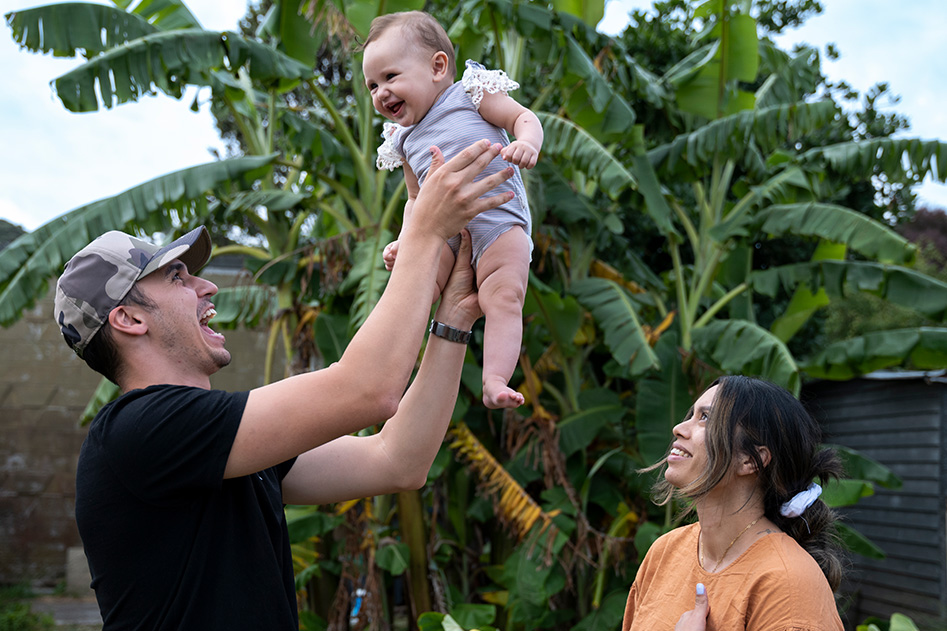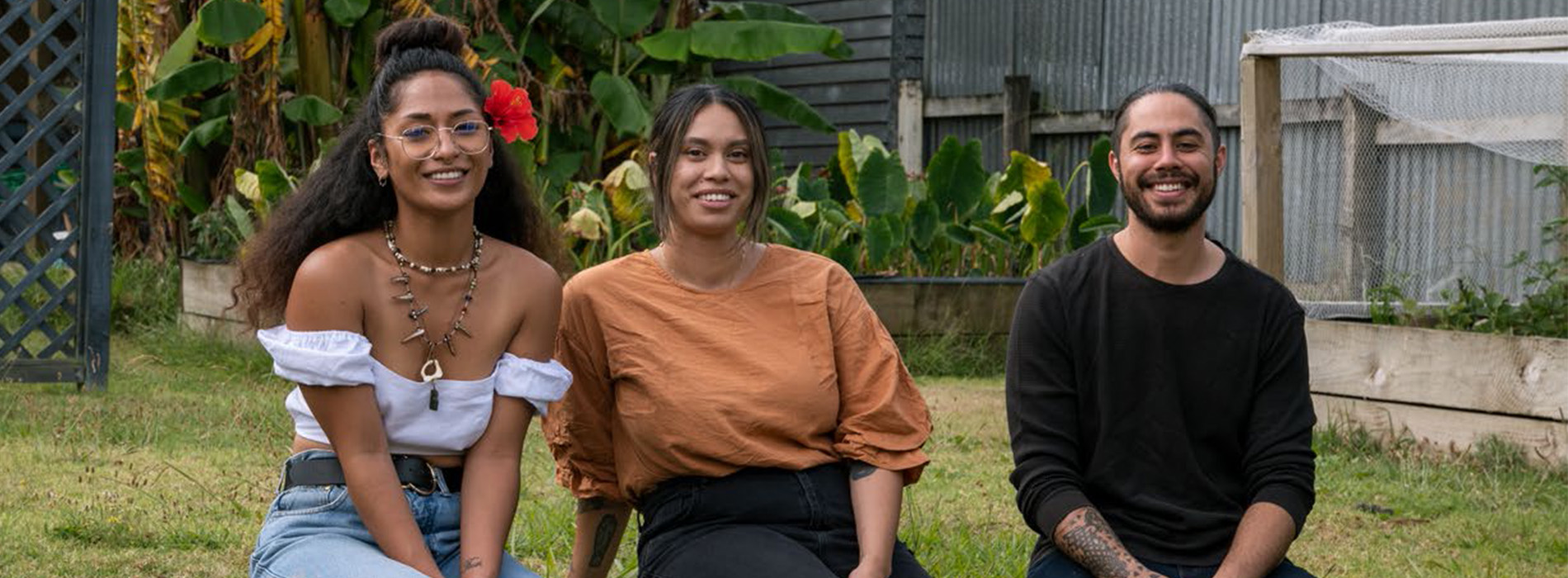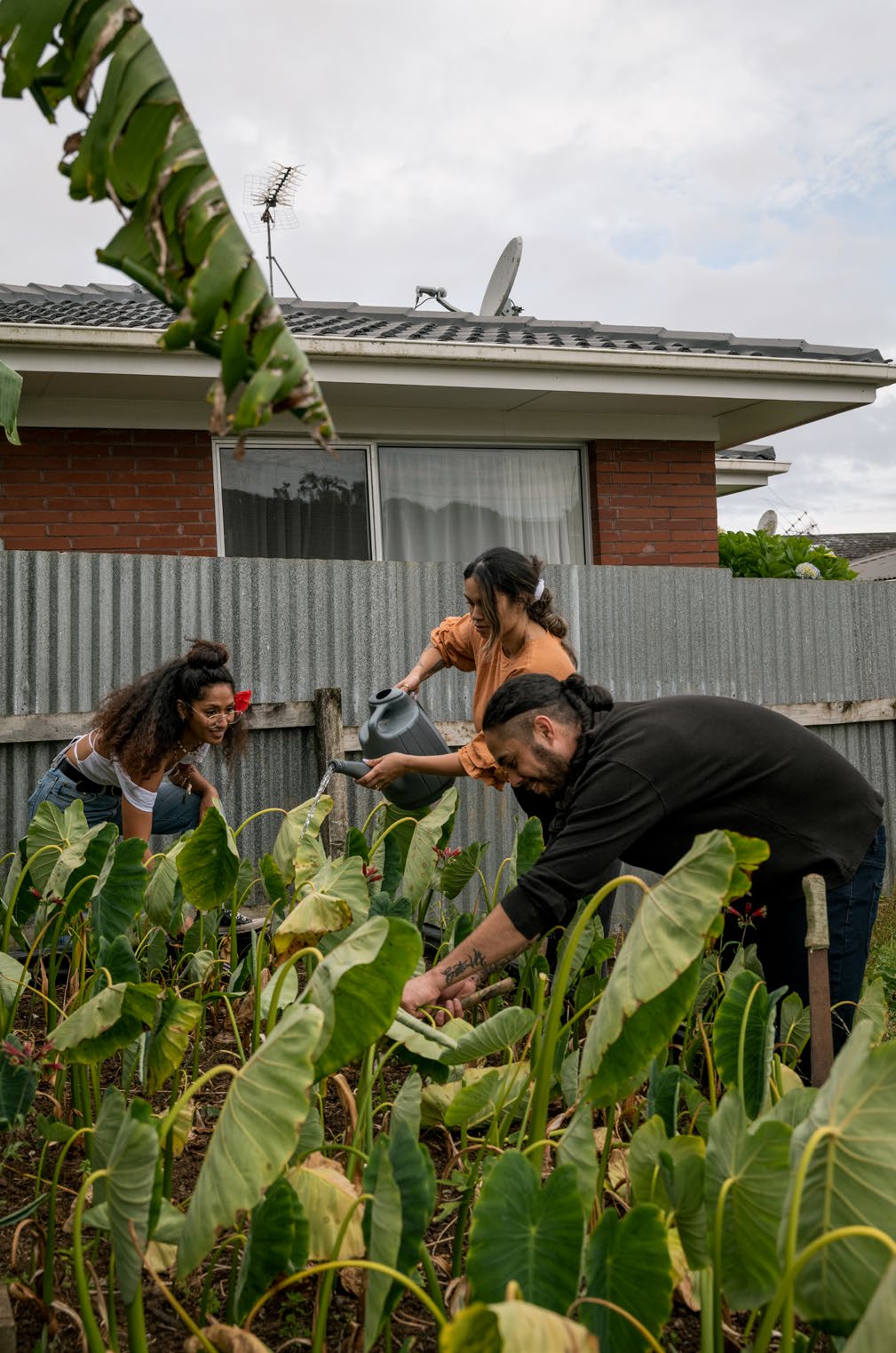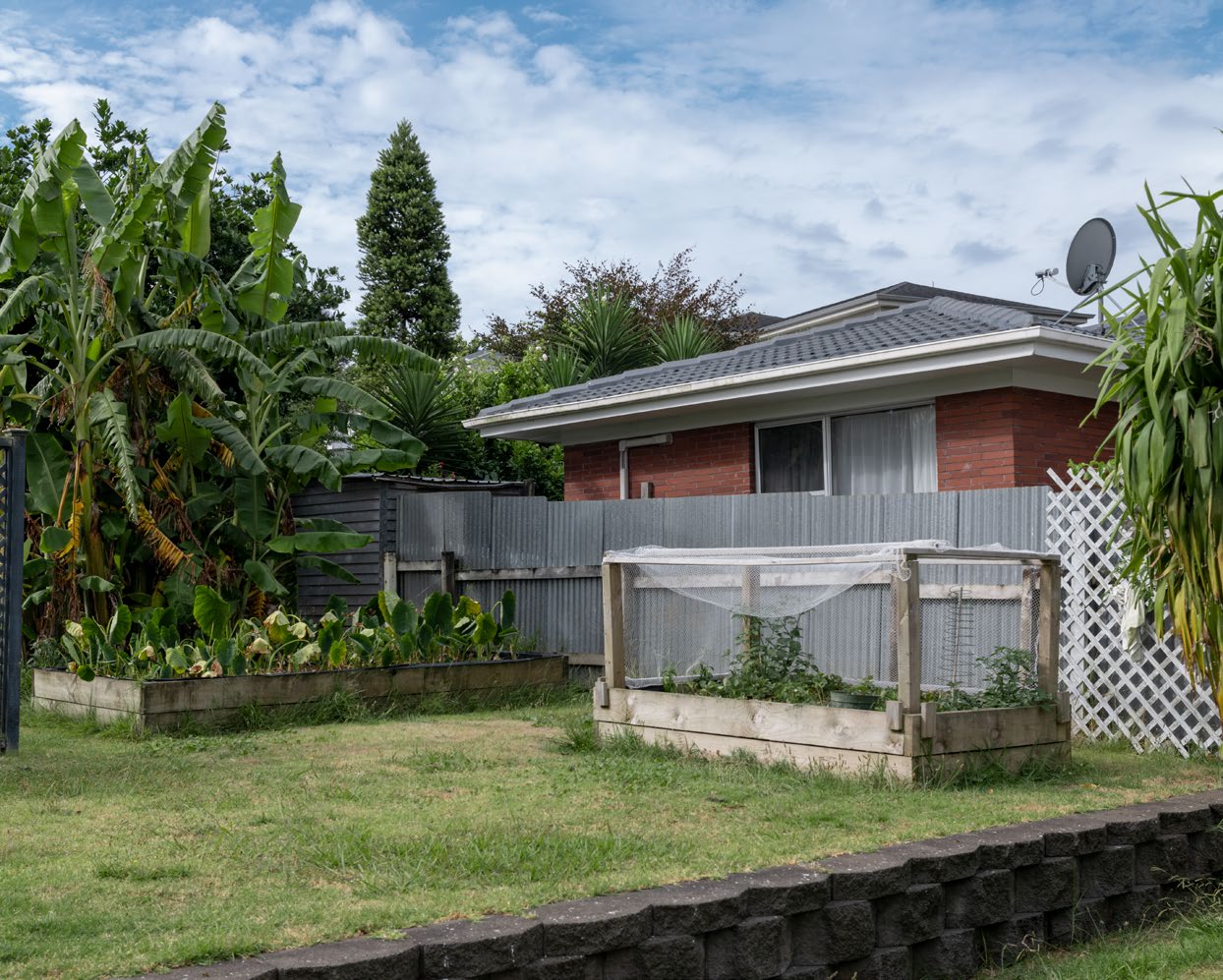
Culture Etc.

From left: Hope Papali‘i, Ani Tawhiao-Lomas and Tausani Simei-Barton.
Tiny Palates, Big Ambitions
The owners of this Auckland-based meal delivery company want to decolonise your baby’s tastebuds.
By Nicola Harvey
Photos by Tim D
Food is a vessel for memory, Tausani Simei-Barton likes to say. It’s a sentiment held within the tender young taro leaves he picks from three raised garden beds in the back yard of his parents’ Mt Albert home in Auckland. The plants descend from a root cutting brought from a village patch in Samoa by his mum’s father decades before strict biosecurity measures guarded Aotearoa’s borders.
In a rented kitchen in nearby Onehunga, the young chef sets the gathered leaves to simmer, watching over the pot as their fibres disintegrate. They’re later reduced further in coconut milk, filling the room with a heavy aroma.
Scooping up a mouthful of leaves, Simei-Barton tests them for the itchy tingle at the back of his throat that indicates the leaves aren’t ready to eat yet. It’s a skill he learned young from his uncles in Samoa — taro leaves can be poisonous if you don’t cook them for long enough. Once he gets the leaves just soft enough, the earthy, spinach-like palusami is ready. It is a nutrient-rich delicacy that tastes like Simei-Barton’s Porirua childhood, transporting him back to feasts when family members would vie for a portion.
In Onehunga, he mixes the palusami with cooked silverbeet, then carefully spoons the mixture into glass jars (100 grams for each), getting them ready for his discerning customers, most of whom have not yet learned to talk. The rest is mixed with smoked kahawai and more coconut milk to create a chunky, protein-rich meal for the slightly older, more adventurous gourmands on his subscriber list.
Simei-Barton co-owns Yawye Babies, a subscription service specialising in preservative-free, indigenous meals for Auckland babies and toddlers. His palusami is one of 26 meticulously handmade products using specialty ingredients like Māori potatoes, kamo kamo, taro and chia seeds, and natural sweeteners like pawpaw and sweet potato, which are delivered in the early mornings and late evenings directly to their subscribers’ doors all over Auckland — the delivery runs aim for a 7am drop off to catch families before they leave for work, or 7pm after they’ve come back home, to make sure someone is there to put the food straight in the fridge.
It’s also a schedule that allows Simei-Barton and his friend and business partner Ani Tawhiao- Lomas, who make the deliveries themselves, to build their start-up business around their other paid work and parenthood. The pair have a vision that Yawye Babies will help create a healthier future generation; working into the night is how they get there.
He mixes the palusami with cooked silverbeet, then carefully spoons the mixture into glass jars, getting them ready for his discerning customers, most of whom have not yet learned to talk.

Ani Tawhiao-Lomas (right) with partner, Giuliano Porta and their baby, Calina Mareikura Porta.
Commercial baby food is designed to be sweet — the sweetness replicates the flavour of breast milk, acting as a signal to babies that the food is energy-rich at a time when energy is what they need most to grow and thrive. In the wake of World War I dietary theory started to closely align nutrition with calories. The agricultural Green Revolution of the 1960s cemented these ideas as cereals, with the aid of synthetic fertilisers, became the dominant crops grown across the world. And the taste of manufactured foods, including baby food, became homogenised with corn byproducts reigning supreme in the calorie and flavour profile — supermarket brands of baby food still typically use added sugars sourced from cane, beet or corn.
In a 2014 study published in the Proceedings of the National Academy of Sciences, the trend towards a globalised palate emerges in a stark crop list. Researchers analysed how people in developing countries sourced their calories and found that between 1969 and 2009 wheat became the major crop staple in all countries surveyed. In the Pacific, many former staple crops with long-held regional and cultural importance such as sweet potato and yam (ingredients which can naturally add sweetness to food), were disappearing from fields and diets, reducing by a third or more.
Dr Lisa Te Morenga, a nutrition and Māori health researcher at Massey University, has studied the impacts of diets laden with free sugars and says there’s sound evidence that children who have high-sugar diets are more likely to gain excess weight during childhood. If this weight gain extends into adulthood it can exacerbate the risk of diabetes, heart disease and other noncommunicable diseases.
She points out that Māori evolved their diets at least once before, in response to settlers introducing new carbohydrate and protein sources. “They were growing successful market gardens at places like Ihumātao with imported foods that were easier to grow in our climate,” Te Morenga says. Today that kind of innovation is needed again, to nudge communities away from cheap, sugar-rich food towards healthy affordable food.
In simple terms Yawye Babies is a meal delivery subscription. But the ambition is more complex: Simei-Barton and Tawhiao-Lomas want to decolonise young palates (a goal which is inextricable from sourcing food sustainably). One father who orders Yawye for his little boy says the meal kit “keeps us culturally connected to our whenua through kai”. To hear that buoys Te Morenga. “The younger generation are a lot more aware of how ‘Big Food’ has sent us down this pathway of doing things that aren’t actually best for babies,” she says.
At Yawye Babies, orders are taken on a Monday, the jars are prepared on Wednesday, and on Thursday — delivery day — Simei- Barton and Tawhiao-Lomas divide up the map and criss-cross the urban sprawl from Beach Haven to Howick, stopping in at about 150 households. Some deliveries include loyalists who’ve signed up to the weekly meal plan of fourteen 100-gram jars: purees for younger babies, mash for those nine months and over, and chunky mixes for toddlers. Others are first-timers drawn in via word-of-mouth marketing and keen to trial the sample pack.
The operation has been running since late 2020, originally conceived of as a business supplying office and construction workers with healthy readymade meals — a plan swiftly scuttled by Covid-19 lockdowns and empty offices. But the root of the business settled, and their side hustle is slowly growing into a viable company.
The idea was originally seeded in Rarotonga when Simei-Barton and his wife, Hope Papali‘i, were working with Cook Islands tourism promoting the Islands’ cultural heritage as a hospitality attraction. At the marae Arai Te Tonga, a sacred place on Rarotonga where the ariki once presided over sacrifice and feasts, Simei-Barton walked among the old headstones, noting the birth and death dates. He noticed the lifespans diminishing across the 20th century. “It was like a real visual reality check,” he says.

Tawhiao-Lomas (centre), Tausani Simei-Barton, and his wife, Hope Papali‘i, tend to the taro patch.
“Like in order for us to live, we need a return to our eating.”
When Simei-Barton returned home, he pitched the idea for an indigenous food company to Tawhiao-Lomas, whose career background was in media and advertising. She recalls thinking that “there was an instant gap in the market”. Tawhiao-Lomas says many young urban Pasifika and Māori families who are disconnected from the land want to connect their kai to whenua as a source of cultural pride, while others see Yawye Babies as an opportunity to buy environmentally sustainable food for their kids. Yawye Babies provides this by prioritising produce not only grown locally but tied culturally to the long food histories of Aotearoa and the Pacific Islands.
Before launching, the pair spent months researching traditional foods — a process that began by asking every elder they knew or met in their Auckland community, “What do you remember eating when you were young?” They heard a rumour of a 900-year-old taro patch that exists in collective memory — and possibly physically — somewhere near Kaikohe. One kuia recounted eating taewa (Māori potato) smeared on toast as a child. The flavour had come flooding back when she snuck a spoonful of her mokopuna’s peruperu and kūmara puree. “We’re much older than people give us credit for,” says Simei-Barton about the food network that props up their fledgling business.
Yawye Babies centres heritage, and sourcing produce can be challenging. Taro leaves come from the family back yard, and other produce is bought from small organic growers in the Pacific Islands whom Simei-Barton connected with through his friend and mentor Robert Oliver, a champion for Pacific cuisine. Ingredients like the peruperu potato rely on growers more dedicated to preservation than profit.
Last year, as Covid-19 caused a supply chain squeeze and greengrocers momentarily closed their doors, New Zealand’s collective attention turned to food and ensuring we had easy access to it. I signed up to a weekly delivery of “reject” vegetables — produce deemed unsuitable for export, too misshapen for our supermarket shelves or surplus to contract needs. Buried at the bottom of a box one week was a handful of dusty purple-fleshed taewa. Having never cooked Māori potatoes before, I took a punt they’d hold their shape for a potato salad. Scrubbed clean, slowly boiled until tender and then drained and tossed with homemade mayonnaise, shaved fennel and sliced red onion, these spuds were a revelation. Firm and waxy, each mouthful dissolved pleasantly on my tongue, leaving a slight tang at the back of my mouth. Why had I been eating Agria potatoes for so long, when these were an option?
I haven’t eaten them since. Attempts to buy any variety of Māori potato in Taupo, the closest town to where I live, have been fruitless. They are a rare luxury, I’ve discovered. Māori potatoes exist because they are cherished by family, not industry. They’re grown in holey buckets filled with compost, not across hundreds of hectares. A North Canterbury potato farmer explained to me that despite the superior flavour, popularity at organic farmers’ markets and high yield, they are not commercially viable. They often get used as loss leaders. Some are prone to disease. And, unlike varieties that have licence fees attached, there’s little interest in putting taewa through a lab process to strengthen the seed stock because the financial return for the corporate entity funding the research is nil. This is because taewa aren’t owned by any one company; the varieties aren’t patented. They exist as a trace of early trade and food resilience among Māori.
The tubers are endemic to the Andean region of South America and were traded into Aotearoa. Once in the soil here the taewa proved more resilient and reliable than the kūmara, which is a fickle taonga. There are modest but concerted efforts to future-proof the more delicate and virus-prone varieties of taewa, including at Koukourarata marae on Banks Peninsula, where the Māori food producer and food sovereignty advocate Manaia Cunningham is working with potato growers and researchers to develop robust varieties for whanau and commercial sale. But the latter is reliant on demand.
During the research phase, they heard a rumour of a 900-year-old taro patch that exists in collective memory — and possibly physically — somewhere near Kaikohe.
People are drawn to the story of Yawye Babies, with its focus on sustainability and indigenous food knowledge — and the interest extends far beyond the South Pacific. One Instagram follower wants to know when they’re shipping to Australia, another to California. Others just want to courier the products to Hamilton. Tawhiao-Lomas says she was particularly touched by one message, sent from the United States, reading: “I just love your companies [sic] story. Makes me want to get closer to my own roots. My family is from Ecuador and we have Inca grains passed down. It’s what I gave my little one but now I’d like to dig deeper.”
Rachel Taulelei, a Māori business leader and CEO for six years of food and beverage company Kono, told me that a common imperative sits beneath the burgeoning indigenous economy: “We exist to serve our grandchildren’s grandchildren and beyond.” To do that, the taonga must be preserved and enhanced. As Simei-Barton and Tawhiao-Lomas continue to expand domestically — Waiheke Island is next on the delivery list — they keep this sentiment at the heart of the business. “New Zealand is so unhealthy at this point, we have a real problem with obesity and other health issues, and yet we achieve so much,” says Simei-Barton. Serving the future is, in their view, the true mark of a sustainable company. “Imagine what our community could do if we created a healthy generation?”

Ingredients for Yawye Babies growing in the back garden.
Nicola Harvey is a Taupo-based writer and audio producer. She wrote North & South’s December cover story, ‘The Fight for the Future of Farming’.


